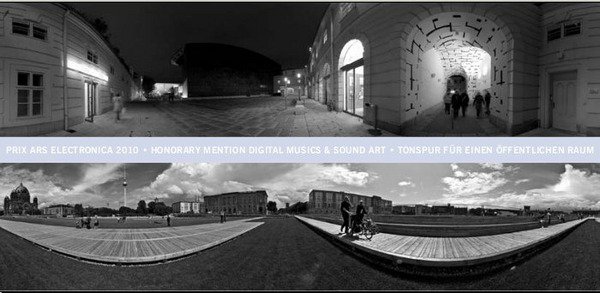Tonspur 42: Peter Weibel
dal 11/6/2011 al 19/8/2011
Segnalato da
11/6/2011
Tonspur 42: Peter Weibel
MuseumsQuartier 21, Wien
The list of significant and influential artists who have been invited by Tonspur to dedicate themselves to acoustic installations and engage with strategies and mechanisms of sound works placed in public urban space continues with the artist, curator, theorist, professor, and director of the Zentrum fur Kunst und Medientechnologie (ZKM) in Karlsruhe, Peter Weibel. He has created a multi-channelled compositions for the Tonspur_passage.

TONSPUR for a public space: Sound works and live-performances. A project by Georg Weckwerth and Peter Szely
Peter Weibel creates a sound installation for the TONSPUR_passage.
A programme of sound works and live-performances by international artists in the Vienna MuseumsQuartier. These artists' multi-channelled compositions go well beyond the standard stereophonic experience, creating captivating acoustic architectures and sound spaces.
"The Passage works are situated in spaces where the physical movement of the listener through the space to reach a destination is inherent. They imply an active role on the part of listeners, who set a static sound structure into motion for themeselves by passing through it", so Neuhaus.
Text und Konzept • Peter Weibel
Recherche • Adam Rafinski
Aufnahme, Klangregie, Realisiation • Holger Stenschke
Sprecher • Annika Martens, Jonas Riemer
Projektleitung • Julia Gerlach
Produktion • TONSPUR für einen öffentlichen raum
entstanden am ZKM | Zentrum für Kunst und Medientechnologie Karlsruhe
The list of significant and influential artists who have been invited by TONSPUR to dedicate themselves to acoustic installations and engage with strategies and mechanisms of sound works placed in public urban space continues with the artist, curator, theorist, professor, and director of the Zentrum für Kunst und Medientechnologie (ZKM) in Karlsruhe, Peter Weibel [*1944, Odessa, Ukraine].
For five years now, the TONSPUR_passage in the MQ Wien has been the permanent venue for, i.e. the place to see and hear, the results of this artistic practise. It is a genre that has gained in significance since the American musician and pioneer of sound art Max Neuhaus established his "Drive in Music" in 1966, writing that: "The Passage works are situated in spaces where the physical movement of the listener through the space to reach a destination is inherent. They imply an active role on the part of listeners, who set a static sound structure into motion for themselves by passing through it".
We are delighted that Peter Weibel has agreed to participate in TONSPUR 42 für einen öffentlichen raum, so flanking his theoretical and communicative engagement with sound as a raw material for making art by completing an art project of his own in this context. It is not least his statement that "sound art has become one of the key currents in the art of the 20th century" which has raised the status of artists who work with sound to the same level as proponents of the more ‘classical' disciplines.
Two major sound projects in the public space of Vienna over the coming months also worthy of appraisal: Matthew Ritchie's sonic pavilion "The Morning Line" for T-B A21 on Schwarzenbergplatz and Andres Bosshard's "KLANGHIMMEL MQ" as a TONSPUR_extra ∞ european_TONSPUR and part of the 10th jubilee of the MQ in the main courtyard of the MuseumsQuartier. [g.w.]
PETER WEIBEL
Life in the Twentieth Century: 225 Million Homicides. An Oratory • A male voice and a female voice recite the numbers, year for year, of the political murders carried out between 1900 and 2000, where they happened, and the official designation. If the names of the 225 million dead were spoken name for name, and each name was to be pronounced over the course of a minute, it would take about 430 years to recite all the names of the political murder victims in the 20th century. No names are mentioned in this oratory: it is, then, an acoustic memorial to the nameless. For the victims have no names. Only the victors have names, and monuments. Murder victims die two deaths, a real death and a symbolic one. Political murder victims die endlessly often, forever, as there is no justice for them — not even at the end of time. Political murder victims only exist as numbers in a list, and nobody is interested in this list. Not only the situation but also the list is symptomatic for the 20th century. “Vivere no, muerte si”, is written on all memorials. The 20th century did not love life, it was the century of the totalitarian systems that govern even everyday matters today. 225 million dead, murdered senselessly for political reasons is the result, an invisible nation almost the size of America. Centuries are needed to recite a list of the dead from a hundred years, name for name. Counting the dead is quicker than death. Which makes death invincible. Culture, remembrance, archives, storage, writing, the media are the only, if paltry, humble and true attempts to minimize and relativize the triumph of death. To tell of the endlessness of death in a few minutes by counting the numbers of the dead is the sleight of art, to rid death of its totality.
Press Contact:
MQ: Irene Preissler
Tel: +43/1/523 58 81-1712, Fax: +43/1/523 58 86 Email: ipreissler@mqw.at
quartier21: Julia Assl
Tel: +43/1/523 58 81-1738, Fax: +43/1/523 58 86 Email: jassl@mqw.at
Opening: Sunday, Jun 12, 17:00
TONSPUR_passage, between MQ Hof 7 and Hof 8
quartier21/MQ in Vienna
MQ, Museumsplatz 1, 1070 Wien
Free entrance
daily, 10:00-20:00



